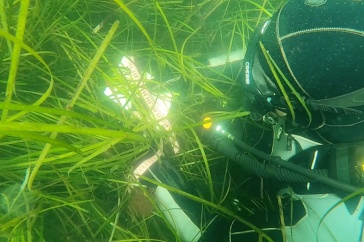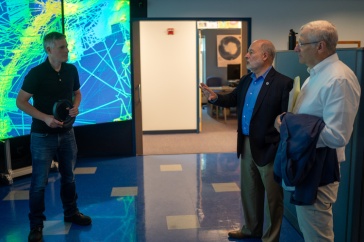
Life on land may have quieted down during the height of the COVID-19 lockdown, but far offshore the Atlantic Ocean was just as noisy as ever. A new acoustics study led by UNH researchers reveals that there was no significant change in the continental shelf’s underwater soundscape during the year 2020 – a surprising contrast to the reports of quieter coastal waters during that same timeframe.
Jennifer Miksis-Olds, director of the UNH Center for Acoustics Research and Education, is the first author on the research published in the Journal of the Acoustical Society of America’s Express Letters. As commercial ocean-going shipping vessels ground to a halt due to the pandemic lockdown, Miksis-Olds wanted to know if the underwater noise levels were coming down as well. The study focused on seven offshore sites geographically spanning Virginia to Florida — places where hydrophones had been placed on the seabed in 2017 and then retrieved in 2021 as part of the Atlantic Deepwater Ecosystem Observatory Network.

“Having that long-term time series was really critical because it allowed for direct comparison of years of data before COVID-19 hit,” she explains. “Acoustic measurements in the deep ocean are more scarce than in coastal waters, so this research provides another perspective on how the deep oceans were impacted — or not — by COVID-19.”
The data indicated that although the noise from commercial shipping vessels decreased, there was an increase in noise from other vessels, like fishing boats and pleasure crafts. The net result: no major difference in the underwater soundscape approximately 45-280 miles from the shoreline.
"Acoustic measurements in the deep ocean are more scarce than in coastal waters, so this research provides another perspective on how the deep oceans were impacted - or not - by COVID-19."
Kim Lowell, a geospatial data analytics expert at the UNH Center for Coastal and Ocean Mapping, is a co-author on the paper. He notes that human-generated ocean noise is a topic of interest right now because of its potential impacts on marine life. “In a perfect world, we’d ride around on the backs of whales and ask them if the noise is bothering them,” he jokes. “Instead, we had some hydrophone data from a handful of sites, and it was my job to find the most appropriate analytical techniques to help answer the question of whether or not COVID-19 lockdown impacted noise levels in the deep ocean. The data were not perfect, but I’m confident that we produced an answer with scientific integrity.”
Miksis-Olds notes that the findings are in direct contrast to what was reported closer to the shoreline, but says that’s why it’s important to examine different aspects of the ocean environment before drawing conclusions.
“It’s fascinating that oceans are so dynamic and variable; different regions really have different personalities based on the natural and human interactions that happen within those waters,” she adds.
Funding for ADEON data collection was supported by the U.S. Department of the Interior, Bureau of Ocean Energy Management, Environmental Studies Program, Washington, D.C. under contract Number M16PC00003, in partnership with ONR and NOAA. Funding for ship time was provided under separate contracts by ONR, Code 32.
The?UNH Institute for the Study of Earth, Oceans, and Space (EOS)?is UNH's largest research enterprise, comprising six centers with a focus on interdisciplinary, high-impact research on Earth and climate systems, space science, the marine environment, seafloor mapping and environmental acoustics. With approximately 100 principal investigators managing more than 400 individual grant awards, and with annual expenditures exceeding $77?million, EOS fosters an intellectual and scientific environment that advances visionary scholarship and leadership in world-class and graduate education.??
-
Written By:
Rebecca Irelan | Institute for the Study of Earth, Oceans, and Space | rebecca.irelan@unh.edu | 603-862-0990



















































